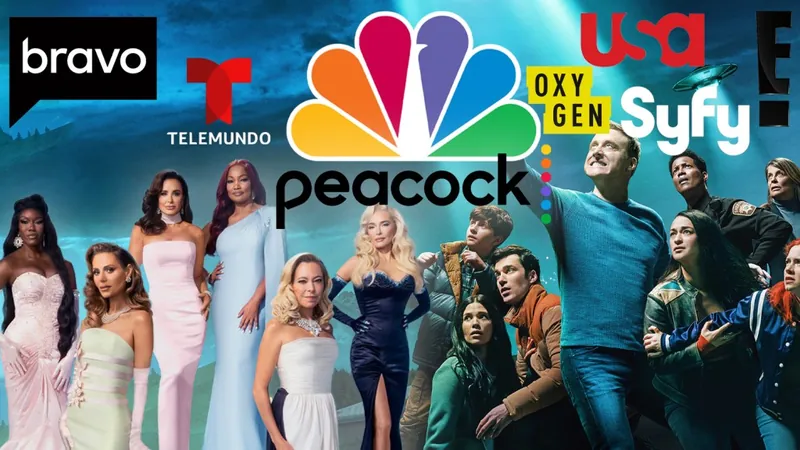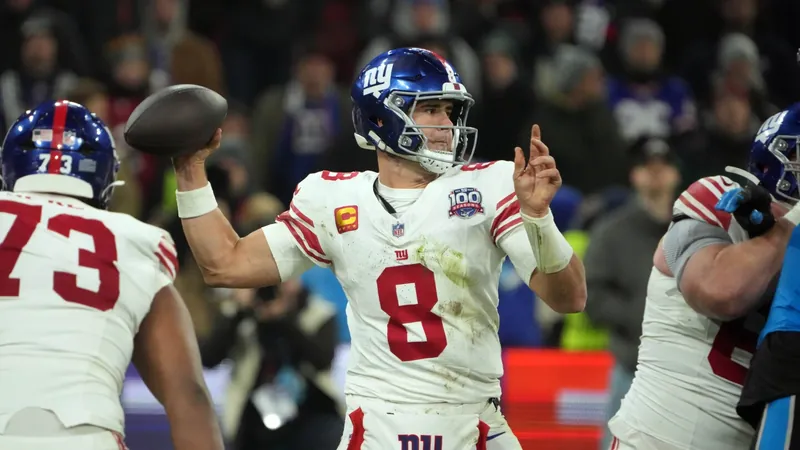
The Future of NBCUniversal: Bravo’s Unique Stand Amid Cable Network Spinoff
2024-11-21
Author: Jia
Introduction
In a landmark shift, Comcast recently announced its decision to spin off most of NBCUniversal’s cable networks, leading to a significant restructuring in the media giant's linear broadcasting landscape. As part of this transition, networks such as NBC, Bravo, and Telemundo will remain under Comcast’s umbrella along with the streaming service Peacock and NBCU’s TV studios. Meanwhile, a multitude of channels including USA Network, Syfy, E!, and Oxygen will be migrated to a newly formed entity dubbed SpinCo, with Mark Lazarus at the helm.
Streaming Dynamics
One of the major reasons behind this segmentation appears to be the evolving dynamics of streaming. This notion is best encapsulated by a modern paraphrasing of James Carville’s famous 1992 remark: 'It’s the streaming, stupid.' The prominence of NBC and Bravo content in Peacock’s Top 10 shows—featuring hits like 'Law & Order: SVU,' the “Chicago” series, and the “Real Housewives” franchise—offers clear insight into this strategy. These two networks have a robust volume of original programming that significantly performs well on Peacock, even securing next-day streaming agreements for their shows.
Challenges for SpinCo
In contrast, networks moving to SpinCo encounter a patchwork of arrangements with Peacock, exemplified by the inconsistent streaming availability of shows like 'Chucky.' This inconsistency raises questions about the strategic capacity of SpinCo to engage with streaming audiences effectively.
Bravo's Cultural Impact
Bravo notably stands out within the NBCU portfolio not just for its successful original content but also for its cultural impact, having created a massive brand presence that extends beyond television. Events such as BravoCon—where fans flock to meet their favorite reality stars—speak volumes about Bravo's status as a pop culture phenomenon.
Ongoing Integration
Despite some overlapping properties to resolve (such as the collaborative People's Choice Awards), the split between the networks suggests a clearer delineation in entertainment content than in news and sports. The latter areas remain closely knitted; NBC News retains an integrated partnership with MSNBC, and NBC Sports continues to oversee events like the English Premier League, extending across various platforms including cable and streaming.
Future Prospects for SpinCo
In light of these changes, the ongoing restructuring of NBCUniversal is expected to yield more than just strategic realignment. Potential staff cuts are anticipated as the new SpinCo, valued at approximately $7 billion, builds its framework. Comcast has emphasized a measured approach to this transition, underscoring the need for quality over speed in establishing SpinCo as a standalone public entity.
Leadership and Investment
Currently, SpinCo operates with a limited executive team, headed by CEO Lazarus and CFO Anand Kini, but they are set to reinforce their ranks as the transition unfolds. Comcast has expressed intentions of strategically investing in the company, a move indicating possible mergers and acquisitions involving other media assets, broadening the scope of content and executive resources available to SpinCo.
Conclusion
As Bravo remains a prominent player within the new structure, its ability to thrive post-spinoff will be a fascinating narrative to follow. What remains clear is that Bravo's enduring appeal and its integration within Peacock positions it as a key asset in NBCUniversal’s evolving strategy in a fiercely competitive entertainment landscape. Whether the rest of NBCU’s networks can carve such a niche for themselves under the new ownership remains to be seen, but one thing is certain: the media landscape is changing rapidly, and only the most adaptable will succeed.


 Brasil (PT)
Brasil (PT)
 Canada (EN)
Canada (EN)
 Chile (ES)
Chile (ES)
 España (ES)
España (ES)
 France (FR)
France (FR)
 Hong Kong (EN)
Hong Kong (EN)
 Italia (IT)
Italia (IT)
 日本 (JA)
日本 (JA)
 Magyarország (HU)
Magyarország (HU)
 Norge (NO)
Norge (NO)
 Polska (PL)
Polska (PL)
 Schweiz (DE)
Schweiz (DE)
 Singapore (EN)
Singapore (EN)
 Sverige (SV)
Sverige (SV)
 Suomi (FI)
Suomi (FI)
 Türkiye (TR)
Türkiye (TR)